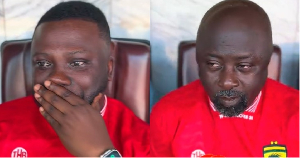General News of Thursday, 28 February 2008
Source: GNA
Please resettle fishes at Bui Dam - Mrs Asmah
Accra, Feb. 28, GNA - Mrs. Gladys Asmah, Minister of Fisheries on Wednesday appealed to engineers working on the Bui Dam project to incorporate in their plans the resettlement of fishes and animals. She said as plans were being made to resettle communities along the banks of Bui, sight should not be lost of the fact that the fishes and the animals would also need some resettlement.
"You as engineers must make sure we do not wipe out colonies of important and rare species," she told participants at the Second Ghana Dams Forum which ended in Accra on Wednesday. It was organized by the International Water Management Institute (IWMI), supported by the Volta Basin Development Foundation (VBDF) and the Centre for Development Research, University of Bonn. Based on the theme; "Impact of Climate Change on the Bui Hydropower Project", the forum brought together representatives from a number of departments and agencies of some ministries, communities affected by the dam, research organizations and civil society groups. Quoting from a research by the University of Aberdeen, Mrs Asmah said the Black Volta, a tributary of Bui, had about 46 species of fish from 17 families, all of them having economic importance. "But with the Dam in place, this fish may be displaced or die due to the impact in change of temperature, water flow, and non-migration for food," she said.
Mrs Asmah said if the Dam came into being, a greater part of the 1,800-square kilometre Bui National Park would be submerged under water as a result.
"Subsequently, the fate of the Black Hippopotamus, whose population we are told are only left with about 140 to 150, is not known." The human race, Mrs. Asmah said, must, however, develop, and dams were some of the useful tools in the enhancement of such development. She therefore advocated that in constructing the Bui Dam, or any other dam for the country, "we must always do it with a human face". "It is left for us as engineers, scientists and stakeholders to make sure that the experiences learnt in the Akosombo and Kpong Dams guide us very critically," Mrs Asmah said.
She appealed to members of the National Co-ordinating Committee to come up with issues that would reduce the negative environmental, social and ecological impact that the new dams would bring. "Indeed, while we think on how to abate the negative impacts, we must also come up with issues on how to maintain, improve and upgrade our existing Dams for better and efficient yields. "Maintenance of our dams should be a priority if we want to maximize their use," Mrs Asmah said.
Professor George Gyan-Baffour, Deputy Minister, Finance and Economic Planning, said though the two large dams in Ghana had been able to meet some of the sets targets and continued to generate benefits after 40 years, "we are beginning to feel the effects of climate change, and its effects on these two large dams".
He called on experts of climate change to advise government on how best to handle the issue as plans continue to advance towards the construction of the Bui Dam. Ms Rita Tani Iddi, Deputy Minister, Lands Forestry and Mines called for a common integrated water resource management based strategy to guide dam development in Ghana. 28 Feb. 08












